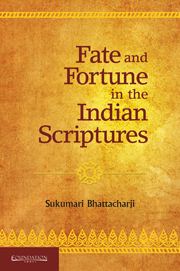Book contents
- Frontmatter
- Contents
- Preface
- Introduction
- Chapter 1 Inception
- Chapter 2 Rebirth and Transmigration
- Chapter 3 Karman and its Consequences
- Chapter 4 Karman, Fate and Free Will
- Chapter 5 Fate, Eschatology and Liberation
- Chapter 6 Premonitions and Presages
- Chapter 7 Deflection: Remedial Measures
- Chapter 8 Vicarious Deflection
- Chapter 9 Fate and Human Endeavour
- Bibliography
- Index
Chapter 1 - Inception
Published online by Cambridge University Press: 05 October 2014
- Frontmatter
- Contents
- Preface
- Introduction
- Chapter 1 Inception
- Chapter 2 Rebirth and Transmigration
- Chapter 3 Karman and its Consequences
- Chapter 4 Karman, Fate and Free Will
- Chapter 5 Fate, Eschatology and Liberation
- Chapter 6 Premonitions and Presages
- Chapter 7 Deflection: Remedial Measures
- Chapter 8 Vicarious Deflection
- Chapter 9 Fate and Human Endeavour
- Bibliography
- Index
Summary
THE concept of fate is ubiquitous although it bears many names in different countries and ages possibly with subtle shades of difference in the connotation of each. Ancient India knew it as Daiva, Bhāgya, Niyati, Kāla, Vidhi, Vidhāna, Vidhilipi, Diṣṭa Bhāgadheya, Bhavitavya (tā), Krtārita, Acintya, Adṛṣṭa, Yadṛcchā and Bhāvī. The Atharvaveda equates Kāla with Rohita. In Daṇḍin's Daśakumāracarita the Maskarins of the Ājīvika school call a fortune-teller, maskarin or kārtāntika.
Early Sumerian literature calls fate Me or Mu; in Akkadian mythology Shimtu stood for fate. At the end of the second millennium B.C. the Mesopotamian epic; Enutna Elish mentions the ‘tablets of destiny’ which it calls Tup Shimati or Dup Shimati. Babylon has a name for the natural order. ‘Ma'at’, Egypt knows destiny as Hathor Shai Rennet who is a partial personification of destiny. The owner of the ‘tablets of destiny’, and hence, the final arbiter of fate was the foremost God in the pantheon. The God Anzu stole these tablets; this act disturbed the balance and harmony of the universe which was restored when the tablets were recovered. Enlil of Nippur was the arbiter of destiny for a time; later, when Marduk usurped the pre-eminent position, he possessed the tablets of fate. In Assyria the national God Ashur inherited the traits of the supreme God and automatically became the arbiter of human destiny.
- Type
- Chapter
- Information
- Fate and Fortune in the Indian Scriptures , pp. 22 - 32Publisher: Foundation BooksPrint publication year: 2014

